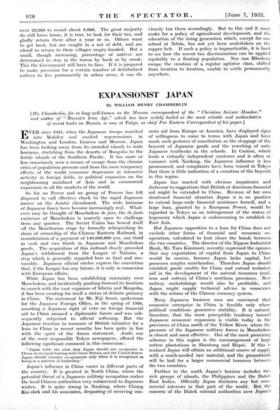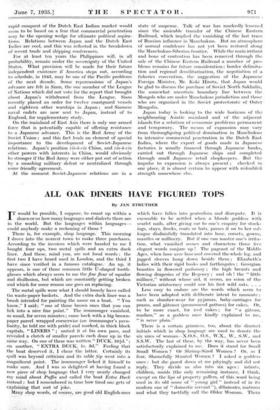EXPANSIONIST JAPAN
By WILLIAM HENRY CHAMBERLIN
[Mr. Chamberlin, for so long well-known as the Moscow correspondent of the "Christian Science Monitor," and author of " Russid-s Iron Age," which has been widely hailed as the most reliable and authoritative . of recent books on Russia, is now at Tokyo, as chief Far Eastern Correspondent of MS paper.] EVER since 1931, when the Japanese troops marched into Mukden and excited repercussions in Washington and London, Geneva and Moscow, Japan has been looking away from its crowded islands to wide horizons, stretching from the deserts of Mongolia to the fertile islands of the Southern Pacific. It has more or less consciously seen a means of escape from the chronic crisis of population pressure and from the more temporary effects of the world economic depression in intensive activity in foreign fields, in political expansion on the neighbouring mainland of Asia and in commercial expansion in all the markets of the world.
So far no Power and no group of Powers has felt disposed to call effective check to the rapid Japanese moves on the Asiatic chessboard. The wide horizons of Japanese fancy have become increasingly real. What- ever may be thought of Manchukuo de jure, the de facto existence of Manchukuo is scarcely open to challenge from any quarter. The Soviet Union has bowed itself off the Manchurian stage by formally relinquishing its share of ownership of the Chinese Eastern Railroad, in consideration of a payment of 140,000,000 yen, one third in cash and two thirds in Japanese and Manchukuo goods. The acquisition of this railroad closely preceded Japan's withdrawal from the League of Nations, a step which is generally regarded here as final and irre- vocable. Japanese official circles express the conviction that, if the League has any future, it is only in connexion with European affairs.
While Japan has been establishing suzerainty over Manchukuo, and incidentally pushing forward its frontiers to march with the vast expanses of Siberia and Mongolia, it has been creating for itself a status of definite primacy in China. The statement by Mr. Eiji Amau, spokesman for the Japanese Foreign Office, in the spring of 1934, asserting a Japanese right of veto on foreign financial aid to China aroused a diplomatic furore and was sub- sequently subjected to official softening. But the Japanese reaction to rumours of British initiative for a loan to China in recent months has been quite in line with the spirit of the Amau statement. Asahi, one of the most responsible Tokyo newspapers, offered the following significant comment in this connexion: "Japan holds the view that Japan should not co-operate in China on an equal footing with Great Britain and the United States. Japan should consider co-operation only when it is recognized as being in a position of leadership."
• Japan's influence in China varies- in different parts of the country. It is greatest in North China, where the potential threat of a Japanese military occupation makes the local Chinese authorities very subservient to Japanese wishes. It is quite strong in Nanking, where Chiang Kai-shek and his associates, despairing of receiving con- crete aid from Europe or America, have displayed signs of willingness to come to terms with Japan and have made such gestures of conciliation as the stoppage of the boycott of Japanese goods and the rewriting of anti- Japanese textbooks in the schools. In Canton, which leads a virtually independent existence and is often at variance with Nanking, the Japanese influence is less pronounced, and complaints have been voiced in Tokyo that there is little indication of a cessation of the.boycott in this region.
Japan has reacted with obvious impatience and disfavour to suggestions that British or American financial aid might be extended to China. Because of her own straitened financial situation Japan is in no position to extend large-scale financial assistance herself, and a large loan, granted by a European Power, would be regarded in Tokyo as an infringement of the status , of hegemony which Japan is endeavouring to establish in East Asia.
But Japanese opposition to a loan for China does not exclude other forms of financial and economic co- operation, calculated to knit closer the bonds between the two countries. The director of the Nippon Industrial Bank, Mr. Taro Kimimori, recently expressed the opinion that any exportation of capital from Japan to China would be unwise, because Japan lacks capital, but possesses surplus merchandise. Therefore Japan should establish goods credits for China and extend technical aid in the development of the natural resources (coal, iron and cotton) of" China's northern provinces. New railway undertakings would also be profitable, and Japan might supply technical advice in connexion with the reform of the Chinese currency system.
Many Japanese business men are convinced that economic enterprise in China is feasible only where political conditions guarantee stability. It is natural, therefore, that the most perceptible tendency toward Japanese economic expansion is visible today in the provinces of China north of the Yellow River, where the pressure of the Japanese military forces in Manchukuo is closest and most effective. One of the most promising schemes in this region is the encouragement of large cotton plantations in Shantung and Hopei. If this is realized Japan will obtain an additional source of supply with a much-needed -raw material, and the groundwork will be laid for a larger commercial turnover between the two countries.
Farther to the south Japan's horizon includes two rich groups of islands, the Philippines and the Dutch East Indies. Officially Japan disclaims any but com- mercial interests in that part of the world. But the concern.' of the Ditch colonial authorities over Japan's rapid conquest of the Dutch East Indian market would seem to be based on a fear that comniercial penetration may be the opening wedge for ultimate political aspira- tions. Relations between Japan and the Dutch East Indies are cool, and this was reflected in the breakdown of recent trade and shipping conferences.
For at least ten years the Philippines will, in all probability, remain under the sovereignty of the United States. What provision will be made for their future Independent existence if America steps out, according to schedule, in 1945, may be one of the Pacific problems of the next decade. Some repercussions of Japan's advance are felt in Siam, the one member of the League of Nations which did not vote for the report that brought about Japan's withdrawal from the League. Siam recently placed an order for twelve coastguard vessels and eighteen other warships in Japan ; and Siamese naval cadets are now sent to Japan, instead of to England, for supplementary study.
On the mainland of East Asia there is only one armed force that is potentially capable of offering resistance to a Japanese advance. This is the Red Army of the Soviet Union ; and this fact lends an element of special importance to the development of Soviet-Japanese relations. Japan's position vis-à-vis China, and vis-à-vis other powers with interests in China, would obviously be stronger if the Red Army were either put out of action by a smashing military defeat or neutralized through some friendly agreement.
At the moment Soviet-Japanese relations are in a state of suspense. Talk of war has markedly lessened since the amicable transfer of the Chinese Eastern Railroad, which implied the vanishing of the last trace of Russian influence in Manchukuo. But an atmosphere of normal confidence has not yet been restored along the Manchukuo-Siberian frontier. While the main irritant and bone of contention has been removed through the sale of the Chinese Eastern Railroad a number of pro- blems remains for future consideration : border delimita- tion and regional demilitarization, the negotiation of a fisheries convention, the suggestion of the Japanese Foreign Minister, Mr. Koki Hirota, that Japan would be glad to discuss the purchase of Soviet North Sakhalin, the somewhat uncertain boundary line between the Mongols who' are under Manchukuo jurisdiction and those who are organized in the Soviet protectorate of Outer Mongolia.
Japan today is looking to the wide horizons of the neighbouring Asiatic mainland and of the adjacent islands for a solution of economic problems permanent and temporary. The means of expansion may vary from thoroughgoing political domination in Manchukuo to intensive commercial penetration in the Dutch East Indies, where the export of goods made in Japanese factories is usually financed through Japanese banks, carried out through Japanese ships and completed through small Japanese retail shopkeepers. But the impulse to expansion is always present ; checked in one place, it is almost certain to appear with redoubled strength Somewhere else.











































 Previous page
Previous page